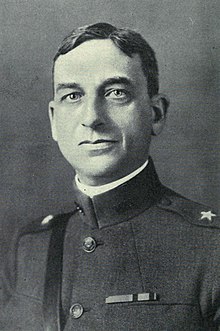Oliver Lyman Spaulding | |
|---|---|
 From 1921's The Official History of the Eighty-Sixth Division | |
| Born | June 25, 1875 St. Johns, Michigan, U.S. |
| Died | March 27, 1947 (aged 71) Washington, D.C. |
| Buried | |
| Allegiance | United States |
| Service | United States Army |
| Years of service | 1898–1939, 1941–1945 |
| Rank | Brigadier General |
| Service number | 0–703 |
| Unit | U.S. Army Field Artillery Branch |
| Commands | 100th Coast Artillery Company 45th Coast Artillery Company 1st Coast Artillery Company 4th Coast Artillery Company 161st Field Artillery Brigade 55th Field Artillery Brigade 165th Field Artillery Brigade Historical Section, American Expeditionary Forces 13th Field Artillery Regiment Historical Section, United States Army War College |
| Wars | China Relief Expedition Philippine–American War Pancho Villa Expedition World War I World War II |
| Awards | Army Distinguished Service Medal Legion of Merit Order of the Black Star (Commander) (France) |
| Alma mater | University of Michigan (AB, 1895) University of Michigan Law School (LL.B., 1896) Harvard University (M.A., 1932) |
| Spouse(s) | Alice Chandler (m. 1902–1947, his death) |
| Children | 1 |
| Relations | Oliver L. Spaulding (father) John Swegles Jr. (grandfather) |
| Other work | Historian and author |
Oliver Lyman Spaulding Jr. (June 25, 1875 – March 27, 1947) was a career officer in the United States Army. A veteran of the China Relief Expedition, Philippine–American War, Pancho Villa Expedition, World War I, and World War II, he attained the rank of brigadier general, and was a recipient of the Army Distinguished Service Medal and Legion of Merit from the United States, and the Order of the Black Star (Commander) from France.
A native of St. Johns, Michigan, Spaulding was the son of Oliver L. Spaulding, a Union Army veteran of the American Civil War who attained the rank of brigadier general by brevet and later served as Michigan Secretary of State and a member of the United States House of Representatives. Spaulding graduated from Washington, D.C.'s Central High School in 1891, and received a Bachelor of Arts degree from the University of Michigan in 1895 and a Bachelor of Laws from the University of Michigan Law School in 1896. In 1898, Spaulding applied for an army commission and was appointed a second lieutenant of Field Artillery.
Spaulding's initial assignments included a posting to Alaska and participation in the China Relief Expedition. He was a 1903 graduate of the Artillery School at Fort Monroe, and a 1905 graduate of the United States Army Command and General Staff College. After serving as an instructor at the staff college, in 1911, he graduated from the United States Army War College. After service in the Philippines for the second time and assignment to the Mexico–United States border during the Pancho Villa Expedition, Spaulding served as assistant commandant of the Field Artillery School at Fort Sill. During World War I, Spaulding served in Europe as commander of several Field Artillery brigades and chief of the historical section on the American Expeditionary Forces staff, and received promotion to temporary brigadier general. Spaulding's historical works were published beginning in 1918, and he was the author of six books.
After World War I, Spaulding was an instructor at the Army War College from 1919 to 1924, served as commander of the 13th Field Artillery Regiment in Hawaii from 1926 to 1929, and was assigned as professor of military science at Harvard University from 1929 to 1935. In 1932, he received a Master of Arts degree from Harvard. From 1935 until his 1939 retirement, Spaulding was again assigned as an instructor at the Army War College. During his retirement, he was a lecturer in history at the Lowell Institute and George Washington University. In 1941, he was recalled to active duty for World War II and served as an instructor at the Army War College. After retiring for the second time in 1945, Spaulding resided in Washington, D.C. He died in Washington on March 27, 1947, and was buried at Arlington National Cemetery.